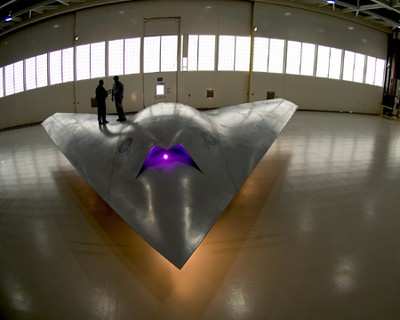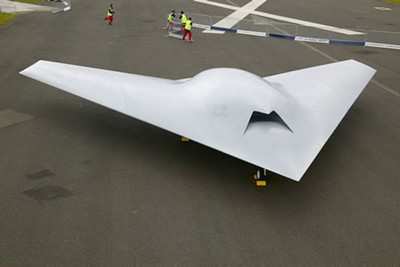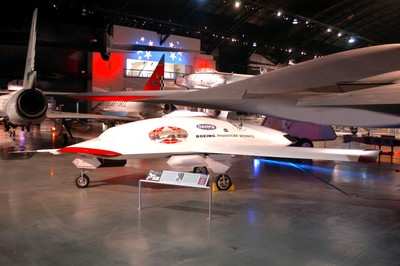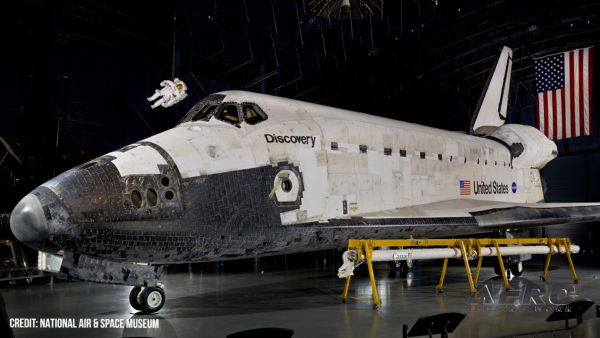Mon, May 11, 2009
Will Develop, Fly 'Phantom Ray' Technology Demonstrator
Boeing has announced plans to develop and demonstrate an
unmanned flying test bed for advanced air system technologies. The
internally funded program, called Phantom Ray, will use the
prototype vehicle that Boeing originally developed for the Defense
Advanced Research Projects Agency (DARPA)/U.S. Air Force/U.S. Navy
Joint-Unmanned Combat Air System (J-UCAS) program.

The Phantom Ray demonstrator is scheduled to make its first
flight in December 2010. The aircraft will conduct 10 flights over
a period of approximately six months, supporting missions that may
include intelligence, surveillance and reconnaissance; suppression
of enemy air defenses; electronic attack; hunter/killer; and
autonomous aerial refueling. The Boeing Phantom Works organization
is employing rapid-prototyping techniques that facilitate the speed
and agility needed to meet the 2010 flight schedule.
"Boeing's goals for the Phantom Ray program clearly demonstrate
our commitment to rapid prototyping and are an important part of
the company's efforts to be a leader in the unmanned aircraft
business," said Phantom Works President Darryl Davis. "We have
mobilized our assets to continue the tremendous potential we
developed under J-UCAS, and now will fully demonstrate that
capability."

Phantom Ray will pick up where the UCAS program left off in 2006
by further demonstrating Boeing's unmanned systems development
capabilities in a fighter-sized, state-of-the-art aerospace system.
The Boeing UCAS program began with the X-45A, which successfully
flew 64 times from 2002 to 2005. Those flights included a
demonstration exercise with two X-45A aircraft that marked the
first unmanned, autonomous multivehicle flight under the control of
a single pilot. Boeing also designed a larger UCAS aircraft, the
X-45C, which will serve as the basis for the Phantom Ray
demonstrator.

"What is particularly exciting about Phantom Ray is that we will
incorporate the latest technologies into the superb X-45C airframe
design," said Dave Koopersmith, vice president of Boeing Advanced
Military Aircraft, a division of Phantom Works. "As we gradually
expand the vehicle's flight envelope, potential users will have
access to a full range of unique capabilities that only this type
of autonomous platform can provide."

Lab testing for the Phantom Ray air vehicle is scheduled for
late 2009, followed by ground testing and first flight in 2010.
More News
Also: Netherlands Donates 18 F16s, 2 737s Collide On Ramp, E-7 Wedgetail Cut, AgEagle's 100th In S Korea The Pilot and Aircraft Privacy Act was introduced in the House by Represent>[...]
“This delivery represents more than just a milestone. It symbolizes our shared commitment to national security and our unwavering support for the men and women who serve on t>[...]
Aero Linx: Vintage Wings of Canada Foundation Vintage Wings of Canada is a not-for-profit, charitable organization with a collection of historically significant aircraft and is run>[...]
From 2023 (YouTube Edition): To Preserve and Teach Incorporated as a non-profit domestic corporation in June 1997, the Army Aviation Heritage Foundation (AAHF) is a one-of-a-kind, >[...]
Also: Air Taxis May Be Close, AgEagle Sells 100th, VAI Likes Bedford, AURA AERO Cleans Up Volocopter has resumed work towards the certification of its VoloCity eVTOL, this time und>[...]
 Airborne 06.30.25: US v ADS-B Misuse, Natl STOL Fire, Volocopter Resumes
Airborne 06.30.25: US v ADS-B Misuse, Natl STOL Fire, Volocopter Resumes Aero-News: Quote of the Day (07.06.25)
Aero-News: Quote of the Day (07.06.25) ANN's Daily Aero-Linx (07.06.25)
ANN's Daily Aero-Linx (07.06.25) Classic Aero-TV: Portrait of the Army Aviation Heritage Foundation
Classic Aero-TV: Portrait of the Army Aviation Heritage Foundation Airborne-NextGen 07.01.25: Volocopter Returns, B23 Energic, Iran Tech In UAVs?
Airborne-NextGen 07.01.25: Volocopter Returns, B23 Energic, Iran Tech In UAVs?





